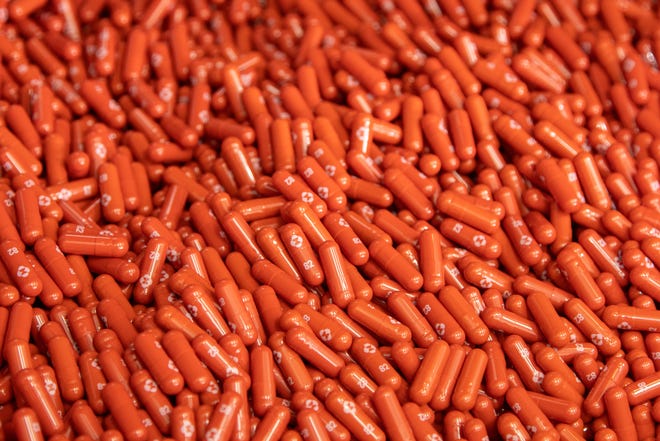
An experimental drug prevented half of COVID-19 infections that would otherwise have sent people to the hospital, according to a study released Friday, offering promise that the virus could soon be treated by a pill.
The antiviral drug molnupiravir, made by Merck & Co. and Ridgeback Biotherapeutics of Miami, was given to 385 people within five days of their diagnosis with COVID-19. Another 377 volunteers who tested positive were given a placebo.
All the participants had at least one risk factor for severe COVID-19. They were either over 60 or had diabetes, obesity or heart disease, the companies said.
Molnupiravir, originally created by researchers at Emory University in Atlanta, is given as four pills taken twice a day for five days.
Of the participants who received molnupiravir, 28 or 7.3% were hospitalized during the month-long trial. In the placebo group, 53 people – or 14% –were hospitalized and 8 of them died.
The study was supposed to enroll another 750 participants, but an independent monitoring board decided the drug was so effective it would be unethical to continue giving anyone a placebo.
Participants in the placebo group raised more safety concerns than those who received the active drug and more placebo recipients dropped out of the trial, according to the companies.
Since early in the pandemic, public health officials have hoped for effective antivirals that could help prevent severe infection in people exposed to the SARS-CoV-2 virus. Several existing drugs were tested against the virus early on but shown to have no benefit for patients.
In June, the Biden Administration allocated $3.2 billion toward the development of an antiviral, saying that the drugs would be a crucial part of the fight against the virus.

“An easily administered oral antiviral drug would be an important part of our therapeutic arsenal that would complement the great success of our vaccine efforts," Dr. David Kessler, chief science officer for the Biden Administration’s COVID-19 response, said at the time.
Of that funding, $1.2 billion was earmarked to buy 1.7 million doses of molnupiravir if the drug met the Food and Drug Administration's safety and effectiveness standards.
Antivirals are drugs designed to keep a virus from replicating and taking hold in the body. They are used effectively to contain HIV in people who are infected and they are commonly taken to reduce the severity of a flu infection.
For instance, Tamiflu, a commonly used antiviral against influenza, has been shown to shorten the course of the flu and can be used to prevent infection in someone who is exposed to the flu virus.
These findings about molnupiravir suggest it is even more effective against SARS-CoV-2 than Tamiflu is against influenza, said Dr. Dean Y. Li, president of Merck Research Laboratories
"This is a substantial impact that in other situations hasn't been seen," he said of the new trial results.
A different trial is still evaluating molnupiravir's effectiveness in preventing sickness in people who have had known exposures to SARS-CoV-2
The FDA agreed that it was appropriate to stop the trial, said Li, who leads Merck's worldwide human vaccines and therapeutics research and development organization.
"The impact is quite important," he added.
Trial participants came from all over the world, including Latin America, Europe, and Africa.

The drug was effective against viral variants Gamma, Delta, and Mu, the study found.
"We have incomplete data, but the viral sequencing data demonstrates that this impact is across the viral barrier," Li said. "That's extremely exciting."
It's not clear how much molnupiravir would cost, but antivirals are generally inexpensive and presidential advisor Dr. Anthony Fauci has said he wants antivirals to be available to people in low- and moderate-income countries.
The companies are in discussions with the FDA and plan to apply for emergency use authorization as quickly as possible.
Contact Karen Weintraub at [email protected].
Health and patient safety coverage at USA TODAY is made possible in part by a grant from the Masimo Foundation for Ethics, Innovation and Competition in Healthcare. The Masimo Foundation does not provide editorial input.
Source link








